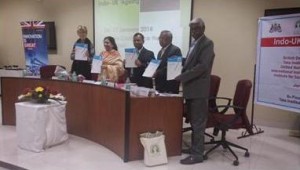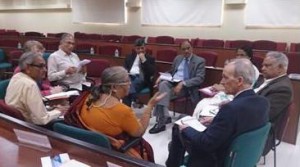7th February 2014 Mumbai, India
UK-India ageing partnerships
Last month was an exciting one for me, as I saw months of hard-work and endless tele-cons, email exchanges and meetings, finally culminate into a fantastic two –day close-door workshop at the Tata Institute of Social Sciences Mumbai. There, we had some of the best of ageing experts from India and the UK gathered under one-roof to discuss one of the most challenging issues that the world is going to face – the issue of a rapidly growing ageing population.

Presently, India has around 90 million elderly and by 2050, this number is expected to increase to 315 million, constituting 20 per cent of the total population. The UK is also faced with this same challenge. The population of the UK is roughly around 64 million, of which 10 million people in the UK are over 65. It has been estimated that the number will have increased to around 19 million by 2050. This is an alarming rate and a warning to all of us. Governments will need to be prepared to tackle the additional strain this will put on families, health and welfare services.

Out of 1,50,000 people who die each day across the globe, it has been estimated that around two-thirds die out of age-related issues. Population ageing arises mainly from two demographic effects – increased longevity and decreased fertility. A third possible factor could be migration.
Studying the dimensions of healthy ageing is, therefore, inarguably of great interest to both countries. The Indo-UK ageing workshop that we had co-organised with the UNFPA, New Delhi, the Tata Institute of Social Sciences, Mumbai (TISS), the International Institute for Populations Sciences, Mumbai (IIPS) and the Institute for Social and Economic Change , Bangalore (ISEC) , was one small step in exploring UK-India partnerships in this important area.
It brought together ageing experts from academia, NGO’s, government and non-government entities and gave a platform to discuss and understand what each of the country’s ageing landscape looks like, the challenges , the expertise that exists in each of these countries and explore opportunities to match each other’s expertise and needs. A report brought out recently by the UNFPA and the TISS, on the Status of the Elderly in Maharashtra, 2011 was also formally released at this workshop.

What came out most interestingly was that the UK and India are both faced with similar challenges, but in different contexts. The volumes of population in both the countries are hugely different. The UK has long experience in the area of mental health and is strong in implementations. There are policy experiences to learn from the UK like for standards of old-age homes and assisted-living technologies for the elderly. India has a huge talent pool and the people itself are the biggest resource available for joint comparative ageing research work. Methodological innovations – how appropriate technologies can be transferred between the two countries; the scope of business collaborations and a multidisciplinary approach towards providing better teaching and training programmes between the two countries were some of the topics that were discussed at this workshop.
A report that captures the recommendations from these discussions is now underway and we now look forward to taking these discussions to the next level of collaborative partnerships in the area of ageing for the benefit of both countries.

The issue of an increasing ageing population is likened to that a time-bomb that could just explode any moment. When I heard this , the immediate question that came to my mind was are we prepared to deal with the kind of socio-economic impact this will have or are we doing enough at present to be prepared for the future? This is indeed a global issue and the time to act is now!
Also do read a blog related to this workshop and topic by one of our UK delegates Ms Adelina Commas from the London School of Economics.
See more information on ageing:
Golden Energizers is a registered NGO working in mumbai & pune region currently in tackling the issues of senior citizens in the state of maharashtra. We propose projects for rural seniors issues ie health, income generating opportunities, their capacity building training programmes in five districts nasik, pune, satara, baramati & kolhapur this financial year. Our state level conference above 200 representatives of senior citizens organization and some seniors from 14 districts of maharahstra state actively participated.
We are inviting interested NGO’s, corporates, resource persons and all stake holders to join our networking forum.